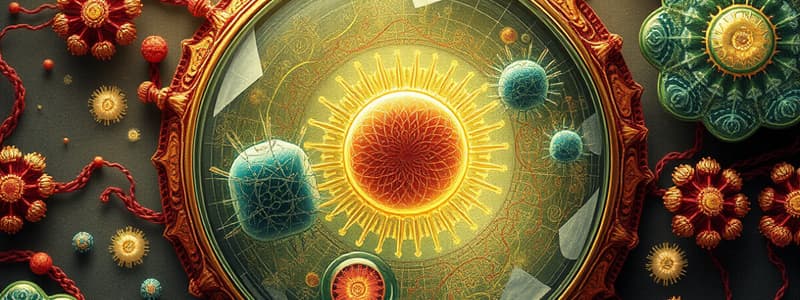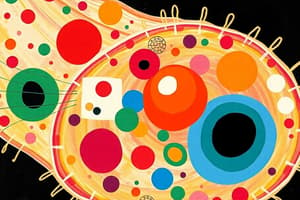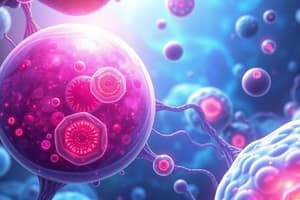Podcast
Questions and Answers
What is the function of a vacuole?
What is the function of a vacuole?
- Moves materials around the cell (correct)
- Holds organelles in place
- Digests foods
- Produces ribosomes
What does a lysosome do?
What does a lysosome do?
Digest foods, clean up and recycle, digest broken organelles
What are ribosomes known for?
What are ribosomes known for?
Making proteins
What is the main function of the Golgi apparatus?
What is the main function of the Golgi apparatus?
What does the cytoplasm do?
What does the cytoplasm do?
What is the role of the nucleus?
What is the role of the nucleus?
What does the nucleolus produce?
What does the nucleolus produce?
What is the function of the nuclear membrane?
What is the function of the nuclear membrane?
What does the cell membrane do?
What does the cell membrane do?
What is the primary function of mitochondria?
What is the primary function of mitochondria?
What does smooth ER do?
What does smooth ER do?
What is the role of rough ER?
What is the role of rough ER?
What do centrioles do?
What do centrioles do?
What is the function of microtubules?
What is the function of microtubules?
Flashcards are hidden until you start studying
Study Notes
Vacuole
- Serves as a membrane-bound sac for storage and transport of materials within the cell.
- Plays a significant role in maintaining cell turgor (pressure).
Lysosome
- Responsible for digesting food particles and breaking down waste materials.
- Recycles damaged organelles, ensuring cellular maintenance and efficiency.
Ribosomes
- Act as protein synthesis sites, translating mRNA into proteins.
- Exist as free ribosomes in the cytoplasm or attached to rough endoplasmic reticulum (ER).
Golgi Apparatus
- Processes, sorts, and packages proteins produced by ribosomes.
- Distributes proteins in vesicles to various parts of the cell or outside of it.
Cytoplasm
- Jelly-like substance that fills the interior of the cell, providing a medium for biochemical processes.
- Composed primarily of water, it supports and suspends organelles.
Nucleus
- Functions as the control center of the cell, regulating gene expression and cellular activities.
- Protects and houses the cell’s DNA, which carries genetic information.
Nucleolus
- Found within the nucleus, it is essential for producing ribosomal RNA (rRNA).
- Plays a role in assembling ribosomes from rRNA and proteins.
Nuclear Membrane
- Double-layered membrane that encases the nucleus, providing protection and structural support.
- Contains nuclear pores that regulate the exchange of materials between the nucleus and cytoplasm.
Cell Membrane
- Composed of a lipid bilayer, acting as a barrier that separates the cell from its external environment.
- Regulates the movement of substances in and out of the cell and is involved in signal recognition via proteins.
Mitochondria
- Known as the powerhouse of the cell, they generate ATP through cellular respiration.
- Feature a double membrane, with inner folds called cristae that enhance energy production efficiency.
Smooth Endoplasmic Reticulum (Smooth ER)
- Involved in the synthesis and transport of lipids and detoxification of drugs and poisons.
- Lacks ribosomes, giving it a smooth appearance.
Rough Endoplasmic Reticulum (Rough ER)
- Embedded with ribosomes, it is primarily responsible for the synthesis of proteins destined for secretion or membrane incorporation.
Centrioles
- Structures that play a vital role in cell division by organizing the mitotic spindle.
- Replicate to ensure equal distribution of chromosomes to daughter cells during cell division.
Microtubules
- Component of the cytoskeleton that provides structure and shape to the cell.
- Facilitate intracellular transport and are involved in cell division and motility.
Studying That Suits You
Use AI to generate personalized quizzes and flashcards to suit your learning preferences.




